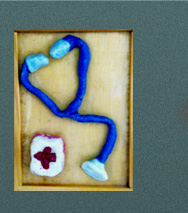
|
What is a urinary tract infection?
The urinary tract means the kidneys, the ureters, which are the tubes that run down from the kidneys, the urinary bladder, which stores urine and the urethra, which is the tube that leads out from the bladder to the outside.
An infection anywhere in this tract is called UTI.
|
| |
 |
How do I know if my child has a UTI?
Your child may have burning while passing urine. He or she may pass urine very frequently. There may be urgency, i.e. he may not be able to hold back the urine, once there is the urge to pass it. Sometimes, he/she may hold back the urine for a long time.
In other situations, there may be only fever, without any urinary complaints.Fever without an obvious cause in very small children needs a urine test, since this may be due to UTI.
In other case ,your child may stop feeding well, may begin to lose weight, or have other complaints like diarrhoea.
Urinary infection is confirmed by doing a urine test. Further confirmation is by doing a urine culture.
|
| |
 |
How will the Infection be treated?
Your doctor will recommend a course of antibiotics.
Along with this, you may be advised to carry out certain measures to aid hygiene and avoid constipation. Your doctor may also recommend some tests.
|
| |
 |
Why are more tests necessary even after infection has been confirmed by urine tests?
Urinary infection may be the pointer to other abnormalities in the urinary system. These may be a blockage in the flow of urine, it may be that urine flows back to the kidneys from the bladder, or other problems. It is important to identify the problem which may be responsible for the infection. Addressing the problem will help to prevent further infections. Repeated infections may be harmful for your child.
|
| |
|
 |
How is urine for culture collected?
To collect urine for culture, ideally the area around the urethra is cleaned with an antimicrobial solution. In boys, the foreskin should be retracted, and in girls, the labia need to be spread apart. The urine collected is ideally supposed to be a mid-stream sample, which means some urine should be allowed to flow away before beginning the collection. The urine should be collected in a sterile jar, which most labs will supply. If the sample cannot be sent to a lab immediately (the sample should be processed within 4 hours), it should be refrigerated.
All these measures are difficult in younger children. Your doctor may pass a tube into the urethra to collect the urine. Occasionally, urine may need to be collected using a needle and syringe. |
|
|













